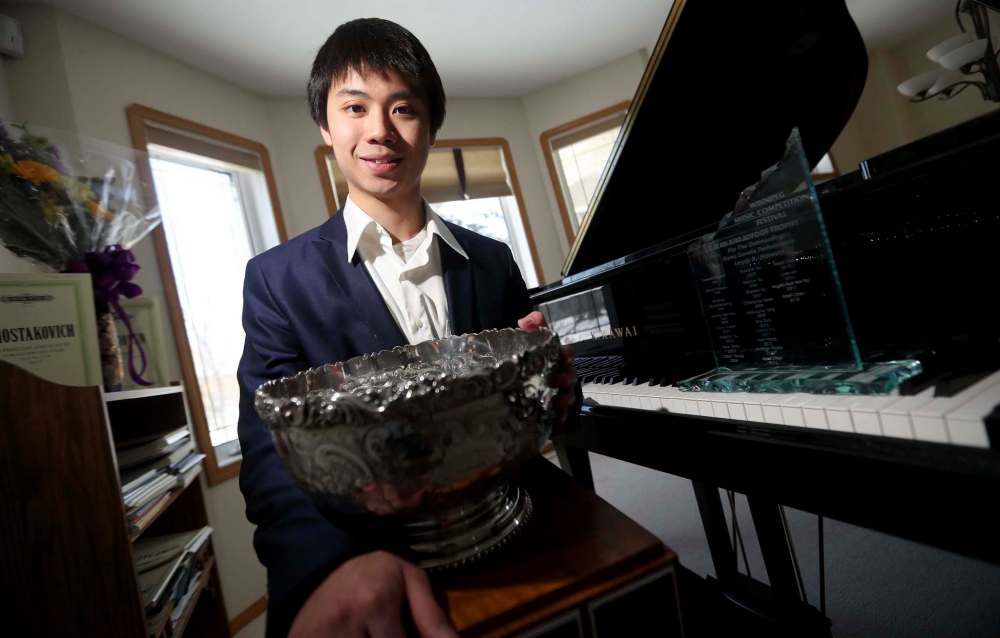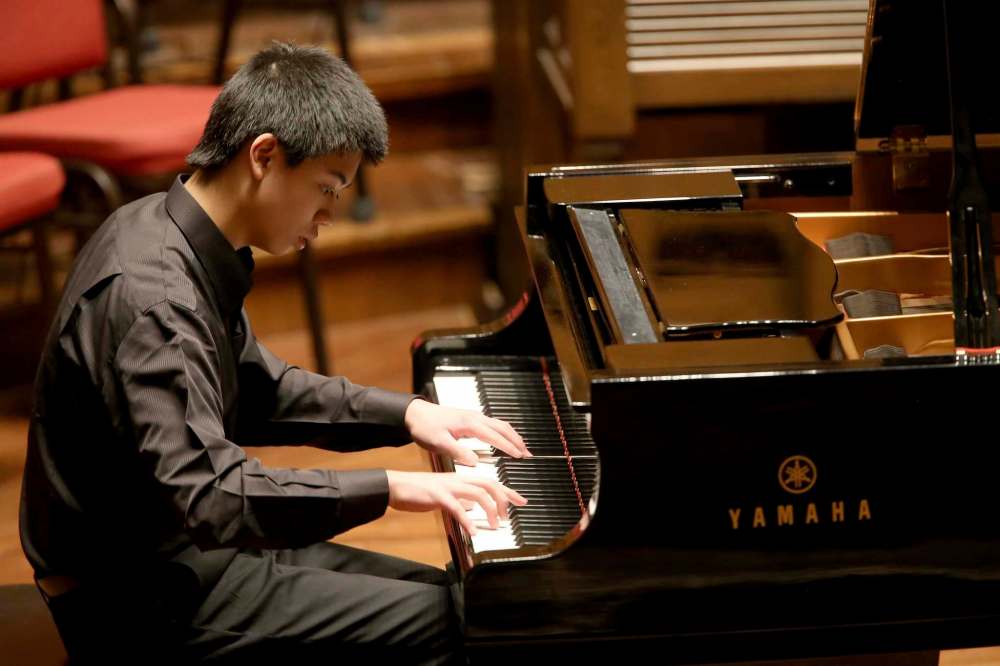The wait is over Persistent U of M pianist takes Aikins prize after five years of being runner-up
Read this article for free:
or
Already have an account? Log in here »
To continue reading, please subscribe:
Monthly Digital Subscription
$0 for the first 4 weeks*
- Enjoy unlimited reading on winnipegfreepress.com
- Read the E-Edition, our digital replica newspaper
- Access News Break, our award-winning app
- Play interactive puzzles
*No charge for 4 weeks then price increases to the regular rate of $19.00 plus GST every four weeks. Offer available to new and qualified returning subscribers only. Cancel any time.
Monthly Digital Subscription
$4.75/week*
- Enjoy unlimited reading on winnipegfreepress.com
- Read the E-Edition, our digital replica newspaper
- Access News Break, our award-winning app
- Play interactive puzzles
*Billed as $19 plus GST every four weeks. Cancel any time.
To continue reading, please subscribe:
Add Free Press access to your Brandon Sun subscription for only an additional
$1 for the first 4 weeks*
*Your next subscription payment will increase by $1.00 and you will be charged $16.99 plus GST for four weeks. After four weeks, your payment will increase to $23.99 plus GST every four weeks.
Read unlimited articles for free today:
or
Already have an account? Log in here »
Hey there, time traveller!
This article was published 11/03/2019 (2467 days ago), so information in it may no longer be current.
Sixth time’s a charm for 20-year-old Winnipeg pianist Albert Chen, who took home the Winnipeg Music Festival’s prestigious Aikins Memorial Trophy Saturday night for his soulful interpretation of Shostakovich’s Prelude and Fugue in D minor, op. 87, no. 24.
The soft-spoken artist has come nail-bitingly close to the trophy before. He’s been named the Aikins runner-up every year since his first attempt in 2014, which would be enough to faze anyone.
However for Chen, who’s in his third year studying piano performance with David Moroz at the University of Manitoba’s Desautels Faculty of Music, quitting was never an option.

“I told myself to keep going, keep going. I’m just really grateful to have this wonderful opportunity to finally win this trophy,” he says during an interview at the Winnipeg Art Gallery immediately after being given the nod by the national jury.
“I knew I had to just play my music, and that it’s more important to focus on what the composer is trying to say and do the best I can.”
Chen admitted he would gladly have been back at the Winnipeg Music Festival for Round 7 in 2020 if history had repeated itself this year.
The Aikins Memorial Trophy, named after James Aikins, Manitoba’s lieutenant governor from 1916 to 1926, has been awarded since 1930 for most outstanding performance in an instrumentalist competition. The prize package also includes the Ann Lugsdin Memorial Bursary, as well as performance opportunities with the Winnipeg Symphony Orchestra and Virtuosi Concerts that showcase emerging local artists.
Chen, who competed in five different classes this year, winning for best Classical Sonata, Concert Etude, and 20th/21st Century Composers, also received the Jean Broadfoot Trophy and the Wednesday Morning Musicale Bursary presented for most outstanding piano sonata performance at the Grade 9 to Honours level, adding further icing to his already sweet musical cake.
“Albert’s playing is very mature musically,” says Thomas Green, the Windsor, Ont.-based chief examiner for the Royal Conservatory of Music and one of the festival’s guest adjudicators. “His performance tonight was very refined technically, and it showed his ability to produce a structure that was also very beautifully detailed. He has a lot of finesse and polish, as well as a lot of emotional depth and good awareness of style.
“His performance had just the winning combination of all the necessary ingredients.”
“I knew I had to just play my music, and that it’s more important to focus on what the composer is trying to say and do the best I can.”–Albert Chen
One of those “ingredients” proved to be a greatly appreciated boost of confidence, courtesy of an email festival executive director Joanne Mercier sent him last year after coming so close — again — telling him not to give up.
He also took to heart Green’s adjudication comments from his performances last week, carefully digesting his words of wisdom that ultimately tipped the balance in his favour on Saturday night.
“I thought a lot about what he said, and realized there was something missing in my playing,” Chen reflects. “My technique is good, the dynamics are there, but I knew I needed to focus more on feeling the music, instead of just playing the right notes so that the audience could feel it as well,” he says of the Soviet composer’s darkly hewn work that begins with hushed tones before building like a tidal wave into an anguished cry from the depths.
A delighted Moroz, who has taught Chen for the last nine years and first introduced the work to him this past January, described the work as requiring a musician who is both “an expert technician,” as well as possessing a “mature and noble spirit.”

Another adjudicator, former Winnipegger Vernon Regehr, a cello and bass professor at the Memorial University of Newfoundland concurs.
“First of all, Albert captured the sombre, dark quality that Shostakovich so typifies,” he says. “But it was really his pacing as he built from the prelude to the fugue… as well as his deeply intense sound that never became bombastic that really catapulted him to the top.”
The three runners-up were pianist Adrian Ferens; cellist Elisheva Schwartz and pianist Anica Warkentine. Regehr also sings praises for them and the night’s eight other competitors —who graciously hugged and shook each other’s hands in a spirit of solidarity after the results were announced.
“These musicians were definitely very collegial. They’re there for each other; they spur each other on during the competition but they also highly supportive of each other. I think that’s a testament of their spirit,” he says.
Chen was born in Dallas, Texas, where his parents were visiting his uncle, and began piano lessons as a seven year old in Taiwan. His family moved to Vancouver — his father is a plastic surgeon — before settling in Winnipeg in 2009 while his father moved back to Taiwan to resume his medical practice.
The elder Chen visits his family as often as possible — he was in Winnipeg to hear his son’s concerto debut last month performing Beethoven’s mighty “Emperor” with the University of Manitoba Symphony Orchestra, and in October 2018 when the pianist toured Manitoba and Saskatchewan as the winner of the biennial Canadian Federation of Music Teachers Association’s Western Young Artist Series Competition.
“One of the reasons why I want to play music is because it allows me to convey emotions that are too complex for words to express.”–Albert Chen
Chen, a graduate of Sturgeon Heights Collegiate, aspires to follow in his father’s footsteps, planning to apply to medicine after completing his music-performance degree. Meanwhile, he takes pre-med science courses to help prepare him for medical school.
He practises up to four hours a day, but away from the keyboard, Chen enjoys skating on The Forks’ river trail, riding his bike or playing with his four-legged friend Astra, a Husky and Labrador mix. Naturally, he also loves to listen to classical music, including favourite Romantic composers Prokofiev and Rachmaninoff, as well as jazz.
Chen’s innate sense of compassion — the lingua franca for health-care practitioners — has also seeped into his approach to music-making, deepening his empathy for the great, yet tormented Soviet composers like Shostakovich. Many pianists don’t dare approach these works until many years of study and life experience, however Chen is fearless about rising to their technical and emotional demands.
“Why Shostakovich? I think it’s the dark side to his music… he suffered a lot under the Soviet empire so you can really hear a lot of internal pain throughout his music,” Chen says. “I like being able to bring out what he felt through his suffering.”
As his own career trajectory begins to lean towards medicine, Chen, who also played French horn and jazz trumpet in high school, says music will always play a key role in his life.
“One of the reasons why I want to play music is because it allows me to convey emotions that are too complex for words to express,” he says. “For example, you can write an essay about something, but music can acutally bring that to life with real, raw emotions.
“I’ll keep playing and make it a part of my life forever.”
holly.harris@shaw.ca












